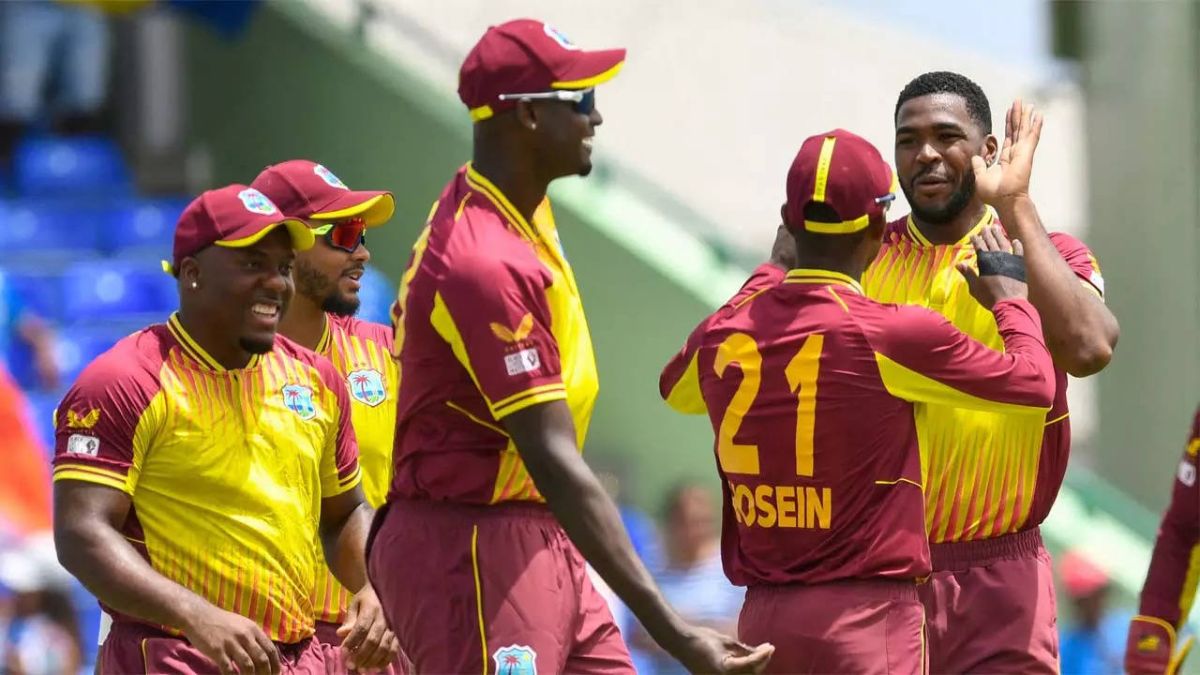In an unexpected turn of events, the West Indies managed to secure victory over India in consecutive T20Is for the first time since 2016. This remarkable achievement has put them in a favorable position to potentially win a T20I series against India for the first time in seven years. However, the path to victory was far from smooth, marked by dramatic twists.
With 27 runs needed from 37 balls and six wickets in hand while chasing a target of 153, the West Indies experienced a sudden collapse, losing four wickets for just three runs within a span of 13 deliveries. This unexpected setback disrupted their initially smooth progress.
Little did anyone anticipate that they would ultimately emerge victorious with seven balls to spare. The turning point arrived through an unbroken ninth-wicket partnership of 26 runs, skillfully crafted by Akeal Hosein and Alzarri Joseph, both occupying the 9th and 10th positions in the batting order.
Prior to their crucial batting rescue, both Akeal Hosein and Alzarri Joseph showcased their all-round abilities by each claiming two wickets, as did Romario Shepherd. This collective bowling effort set the foundation for their triumph by limiting India to a total of 152 runs.
Nicholas Pooran played a pivotal role in the chase, leading the charge with an impressive innings of 67 runs from 40 balls. His knock included six boundaries and four towering sixes, effectively maintaining pressure on the Indian team throughout their pursuit of victory.
Powell’s Calls and Bowlers’ Precision Shine
Despite losing the toss, Rovman Powell’s strategic decisions effectively unsettled India’s batsmen on a challenging pitch that offered grip and turn. Powell’s tactics involved frequent rotations of bowlers, preventing the Indian team from establishing any consistent rhythm at the crease.
The West Indies bowlers executed this plan with precision, resulting in a combined effort of 4 for 111 from 16 overs, maintaining an economy rate of less than seven runs per over. Their varied arsenal of deliveries, including fast deliveries with skid, slower balls, cutters, and turning deliveries from both pace bowlers and left-arm spinner Akeal Hosein, proved difficult for the Indian batters to handle.
Throughout India’s innings, the West Indies team successfully capitalized on the pitch’s attributes. Instances such as a leading edge by Shubman Gill, a direct-hit run-out of Suryakumar Yadav, a stumping of Sanju Samson due to the ball’s turn and precise deliveries to dismiss Hardik Pandya and Ishan Kishan all played a role in keeping India’s scoring in check. The challenging nature of the pitch was evident as India struggled to reach 53 for 2 in the initial nine overs of their innings.
Nicholas Pooran’s Batting Fireworks Rattle India
Nicholas Pooran stepped onto the crease with the West Indies in a precarious position at 2 for 2 after just four deliveries. Initially, he struggled to find his footing, managing only a solitary run from his first five balls. However, it was as if he suddenly awoke from a deep slumber and shifted into a higher gear.
In the third over, he unleashed a powerful heave over long-on for a six and followed it up with a slashing boundary through point. The fifth over saw him aggressively dispatching deliveries from Mukesh Kumar for consecutive fours through slaps and drives across the cover. The sixth over, bowled by Ravi Bishnoi, witnessed a flurry of boundaries – Pooran striking 4, 6, 4, 4 – bringing the powerplay phase to an end with the West Indies amassing 61 runs.
Displaying a remarkable turnaround, Pooran reached his fifty in just 29 balls as the tenth over began. His presence infused confidence and optimism for the West Indies team, painting a rosy picture for their innings. However, his departure from the crease marked the start of a brief downfall, causing tension and unease in the dressing room.
Fortuitously, Akeal Hosein and Alzarri Joseph rose to the occasion, exhibiting a resolute demeanor to stabilize the innings. Their composed performance guided the West Indies towards their ultimate triumph.




































